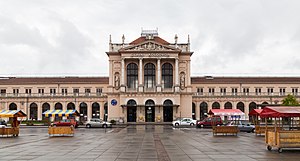Zagreb Glavni kolodvor (Croatian for Zagreb main station[1]) is the main railway station in Zagreb, Croatia.[2] Located 1 km (0.62 mi) south of the city's main square,[1] it is the largest station in Croatia and the main hub of the Croatian Railways network.
Glavni kolodvor | |||||||||||
|---|---|---|---|---|---|---|---|---|---|---|---|
 Main entrance | |||||||||||
| General information | |||||||||||
| Location | Trg kralja Tomislava 12, Zagreb Croatia | ||||||||||
| Coordinates | 45°48′17″N 15°58′44″E / 45.80472°N 15.97889°E | ||||||||||
| Line(s) | |||||||||||
| Platforms | 7 | ||||||||||
| Tracks | 9 | ||||||||||
| History | |||||||||||
| Opened | 1892 | ||||||||||
| Rebuilt | 1987 | ||||||||||
| Electrified | 1970 (25 kV 50 Hz AC to Belgrade and 3 kV DC to Rijeka) 1985 (25 kV 50 Hz AC to Rijeka) | ||||||||||
| Services | |||||||||||
| |||||||||||
| Type | Cultural | ||||||||||
History
editAn 1890 act of the Royal Hungarian Government authorised the building of the main station and maintenance shop in Zagreb.[3] Construction of the 186.5 m (612 ft) long neoclassical style station building began in 1891[4] and was overseen by Hungarian architect Ferenc Pfaff.[1] Sculptural works were undertaken by the Hungarian sculptor Vilim Marschenko.[3] The station opened on 1 July 1892.[3] It is one of the largest public buildings built in 19th century Zagreb.[5]
Reconstruction works were undertaken in 1986–87 (just before the 1987 Summer Universiade) and again in 2006.[6]
International Lines
edit- EC 158/159 CROATIA: Zagreb – Graz – Vienna Hbf (through Maribor)
- 200/201 AGRAM: Zagreb – Budapest Déli (through Koprivnica)
- 204/205 GRADEC: Zagreb – Budapest Déli (through Koprivnica)
- 210/211 SAVA: Villach – Zagreb – Vinkovci
- EC 212/213 MIMARA: Zagreb – Villach (– Frankfurt Hbf)
- 412/413: Zagreb – Belgrade
- IC 310/311: Zagreb – Villach
- 414/415: Belgrade – Zagreb – Schwarzach im Pongau (- Zürich HB)
- EN 498/499 LISINSKI: Zagreb – München Hbf.
Public transport
editDirectly in front of the main railway station, there is a stop for Zagreb tram lines 2, 4, 6, 9 and 13. They are operated by the Zagreb Electric Tram (ZET). With lines 2 and 6 you can reach the Bus station, which is three stops away and from which many buses travel to larger and smaller cities in Croatia and neighboring countries.
Train Disaster
editOn 30 August 1974, the station was the site of the deadliest train accident in Yugoslavia at the time, with 153 people dead. The incident occurred when a train from Belgrade headed for Dortmund derailed at the entrance of the station.[7][8]
Gallery
edit-
Interior
-
A view of the platforms from the east
-
HŽ series 6111 inter-urban train at a platform
-
Statue of King Tomislav in front of the railway station
-
Details of statues of Neoclassicism
-
Railway platform view
See also
editReferences
edit- ^ a b c Piers Letcher (March 2013). Croatia. Bradt Travel Guides. p. 81.
- ^ Mark Smith. "Visiting the city of Zagreb". Seat61.com.
- ^ a b c "The main railroad station house at Zagreb". Hrvatska pošta.
- ^ "Prvi vlak pristaje na Južnom kolodvoru".
- ^ Damjanovic, Dragan. "In the Shadow of Budapest (and Vienna) – Architecture and Urban Development of Zagreb in the Late 19th and Early 20th Centuries. // Zeitschrift für Ostmitteleuropa-Forschung / Journal of East Central European Studies. 67 (2018), 4; 522-551". Zeitschrift für Ostmitteleuropa-Forschung / Journal of East Central European Studies.
- ^ "Trg kralja Tomislava". Vjesnik (in Croatian). 1999-08-03. Archived from the original on 2009-03-26.
- ^ "Najveća željeznička nesreća u hrvatskoj povijesti – Crna kronika – Hrvatska – Dalje.com". 2015-04-03. Archived from the original on 2015-04-03. Retrieved 2023-12-03.
- ^ Malcolm W. Browne (1974-09-01). "Yugoslays Mourn 150 Killed in Zagreb Train Crash". The New York Times. ISSN 0362-4331. Retrieved 2023-12-03.